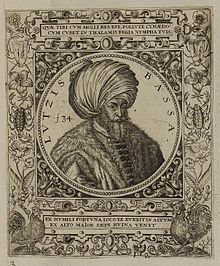Lütfi Pascha

Lütfi Pascha ( Arabic لطفى پاشا, Luṭfī Paşa ; Turkish Lütfi Paşa , also Damat Çelebi Lütfi Paşa ; * around 1488 in Vlora ; † March 27, 1564 in Didymoticho ) was an Ottoman statesman, general and from 1539 to 1541 Grand Vizier of the Ottoman Empire under Suleyman I.
Life
Lütfi came from Vlora in what is now Albania. He was withdrawn from his Christian parents and Islamized as part of the boy harvest under Bayezid II . After his training, he served in various positions within the palace.
His first office outside the palace was Sandschakbey of Kastamonu and shortly afterwards he became Beylerbey of Karaman . Lütfi Pascha himself gave these details of his life in the introduction to his Asaf name . However, he did not give any dates and left all details of his life undisclosed before entering the palace. It could also have served as the Sanjakbey of Aydın and then of Yanya ( Ioannina ), as the writer Feridun Ahmed Bey mentions in his historical work Münşe'at al-selâtin a Lütfi Bey who was Sanjakbey of Aydın at the siege of Rhodes (1522) . Under Suleyman I he took part in the campaigns of the siege of Belgrade (1521) and 1522 of Rhodes, as well as of Buda and Vienna (1529). In 1529/30 and 1531/32 he held the office of Beylerbey of Damascus.
In the Muslim year 941 (1534/35) he became the third vizier. At that time, he had 1533 to 1536 in the War of Suleiman against the Safavids served in eastern Anatolia. He then took over command of the Ottoman fleet from Süleyman in 1537, while the Sultan carried out a land campaign against Vlora and Corfu. Together with Admiral Hayreddin Pascha , Lütfi Pasch attacked Corfu, but could not take the fortress. Despite the protests of Hayreddin and Lütfi, Süleyman lifted the siege and the island remained under Venetian control.
In 1538 Lütfi Pascha became second vizier and was appointed grand vizier in 1539 after the death of Ayas Mehmed Pascha . As a statesman, Lütfi Paşa emphasized the importance of the Ottoman sea power and set up naval squadrons outside the capital. He negotiated with Venice to end the war and won Monemvasia and Nauplion , former Venetian naval bases on the south coast of Greece.
In 1541, he beat his wife, Sah-ı Huban Sultan, a sister of Suleyman, after she complained about the Pascha's excessively harsh punishment of an adulteress. The princess divorced with Suleyman's permission. The Sultan then deposed Lütfi Pascha and appointed Hadım Süleyman Pascha as the new Grand Vizier.
Lütfi Pascha settled in Dimetoka ( East Macedonia and Thrace ) and devoted himself to writing. He wrote twenty works, thirteen of them in Arabic and seven in Turkish. His writing Asafname was a "manual" for ministers and Tevâriḫ-ii-Os̱mân an examination of Ottoman history, which also reflects his own experiences during the rule of the sultans Bayezid II , Selim I and Suleyman I.
reception
In the television series The Ottoman Empire - Harem: The Path to Power over the Life of Süleyman I, Lütfi Pascha is played by the Turkish actor Mehmet Özgür .
Individual evidence
- ↑ George Gawrych: The Crescent and the Eagle: Ottoman Rule, Islam and the Albanians, 1874-1913 . IB Tauris, New York 2006, ISBN 978-1845112875 , p. 58
- ↑ Feridun Ahmed Bey: Münşe'at al-Selatin , Istanbul 1857
- ↑ a b c d e f g Christine Isom-Verhaaren: Lütfi Paşa . In: Kate Fleet, Gudrun Krämer, Denis Matringe, John Nawas, Everett Rowson (Hrag.): Encyclopaedia of Islam . Online edition, accessed May 3, 2020
- ^ Mehmed Süreyya: Sicill-i Osmani. Volume III, Tarih Vakfı Yurt Yayınları, Istanbul 1996, ISBN 975-333-0383 p. 903
| personal data | |
|---|---|
| SURNAME | Lütfi Pascha |
| ALTERNATIVE NAMES | Damat Çelebi Lütfi Paşa; Lütfi Paşa |
| BRIEF DESCRIPTION | Ottoman statesman and Grand Vizier of the Ottoman Empire |
| DATE OF BIRTH | around 1488 |
| PLACE OF BIRTH | Vlora |
| DATE OF DEATH | March 27, 1564 |
| Place of death | Didymoticho |